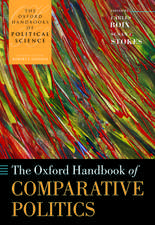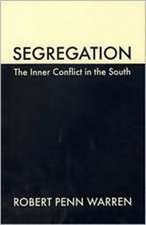Political Order and Inequality: Their Foundations and their Consequences for Human Welfare: Cambridge Studies in Comparative Politics
Autor Carles Boixen Limba Engleză Paperback – 15 feb 2015
| Toate formatele și edițiile | Preț | Express |
|---|---|---|
| Paperback (1) | 164.94 lei 3-5 săpt. | |
| Cambridge University Press – 15 feb 2015 | 164.94 lei 3-5 săpt. | |
| Hardback (1) | 501.38 lei 6-8 săpt. | |
| Cambridge University Press – 22 feb 2015 | 501.38 lei 6-8 săpt. |
Din seria Cambridge Studies in Comparative Politics
-
 Preț: 179.15 lei
Preț: 179.15 lei -
 Preț: 267.61 lei
Preț: 267.61 lei -
 Preț: 239.36 lei
Preț: 239.36 lei - 9%
 Preț: 594.67 lei
Preț: 594.67 lei -
 Preț: 160.82 lei
Preț: 160.82 lei -
 Preț: 269.58 lei
Preț: 269.58 lei -
 Preț: 264.74 lei
Preț: 264.74 lei -
 Preț: 177.28 lei
Preț: 177.28 lei -
 Preț: 225.70 lei
Preț: 225.70 lei -
 Preț: 236.42 lei
Preț: 236.42 lei -
 Preț: 185.64 lei
Preț: 185.64 lei -
 Preț: 233.13 lei
Preț: 233.13 lei -
 Preț: 206.71 lei
Preț: 206.71 lei -
 Preț: 231.82 lei
Preț: 231.82 lei -
 Preț: 206.52 lei
Preț: 206.52 lei -
 Preț: 201.24 lei
Preț: 201.24 lei -
 Preț: 358.37 lei
Preț: 358.37 lei -
 Preț: 203.42 lei
Preț: 203.42 lei -
 Preț: 232.45 lei
Preț: 232.45 lei -
 Preț: 257.82 lei
Preț: 257.82 lei -
 Preț: 191.12 lei
Preț: 191.12 lei -
 Preț: 158.77 lei
Preț: 158.77 lei -
 Preț: 199.05 lei
Preț: 199.05 lei - 11%
 Preț: 553.80 lei
Preț: 553.80 lei - 11%
 Preț: 695.06 lei
Preț: 695.06 lei -
 Preț: 288.80 lei
Preț: 288.80 lei -
 Preț: 262.06 lei
Preț: 262.06 lei - 11%
 Preț: 691.66 lei
Preț: 691.66 lei -
 Preț: 388.29 lei
Preț: 388.29 lei -
 Preț: 288.04 lei
Preț: 288.04 lei -
 Preț: 228.00 lei
Preț: 228.00 lei -
 Preț: 385.28 lei
Preț: 385.28 lei -
 Preț: 312.89 lei
Preț: 312.89 lei -
 Preț: 224.44 lei
Preț: 224.44 lei -
 Preț: 287.07 lei
Preț: 287.07 lei -
 Preț: 251.27 lei
Preț: 251.27 lei -
 Preț: 313.70 lei
Preț: 313.70 lei -
 Preț: 277.38 lei
Preț: 277.38 lei -
 Preț: 423.79 lei
Preț: 423.79 lei - 11%
 Preț: 552.94 lei
Preț: 552.94 lei - 11%
 Preț: 554.43 lei
Preț: 554.43 lei - 14%
 Preț: 783.26 lei
Preț: 783.26 lei
Preț: 164.94 lei
Nou
Puncte Express: 247
Preț estimativ în valută:
31.56€ • 33.13$ • 26.20£
31.56€ • 33.13$ • 26.20£
Carte disponibilă
Livrare economică 20 martie-03 aprilie
Preluare comenzi: 021 569.72.76
Specificații
ISBN-13: 9781107461079
ISBN-10: 1107461073
Pagini: 334
Ilustrații: 50 b/w illus. 2 maps 24 tables
Dimensiuni: 151 x 229 x 18 mm
Greutate: 0.5 kg
Editura: Cambridge University Press
Colecția Cambridge University Press
Seria Cambridge Studies in Comparative Politics
Locul publicării:New York, United States
ISBN-10: 1107461073
Pagini: 334
Ilustrații: 50 b/w illus. 2 maps 24 tables
Dimensiuni: 151 x 229 x 18 mm
Greutate: 0.5 kg
Editura: Cambridge University Press
Colecția Cambridge University Press
Seria Cambridge Studies in Comparative Politics
Locul publicării:New York, United States
Cuprins
1. Tabula rasa; 2. Political order; 3. Technological progress; 4. Warfare; 5. Inequality; 6. Modern breakthrough; 7. Conclusions.
Recenzii
'With analytical clarity and fresh data, Carles Boix has produced a work that cannot be ignored by scholars interested in the biggest questions about politics, economics and society. What kinds of regimes generate the strongest economies? Where do these regimes come from? What is the relationship among politics, growth and inequality? Boix does not offer sound bite answers. Deeply historical, this book provides a multi-layered, interdisciplinary analysis of how we got where we are today and what our prospects are for the future.' Frances Rosenbluth, Damon Wells Professor of Political Science, Yale University, Connecticut
'Charles Tilly famously said that 'war makes the state and the state makes war'. In this impressive new volume, Carles Boix argues, with ingenious tests, extensive data and methodological rigor, that, indeed, 'it was inequality and war, rather than the logic of efficiency gains, that made the state'. Political Order and Inequality is a major contribution to our understanding of state formation and the origins of inequality.' Robert O. Keohane, Woodrow Wilson School of Public and International Affairs, Princeton University, New Jersey
'Deploying cutting-edge analytic rigor, deep historical insight and sound quantitative evidence, Carles Boix has produced a wonderfully engaging book. The book reveals how inequality is the price we pay for our economic well-being and that material wealth is inextricably linked to the origin of the state. Specific forms of political obligation are shaped by how societies balance the tension produced by shifts in military technology and how they are harnessed by political organizations. Boix is equally deft at discussing the Neolithic revolution, the measurement of inequality through skeletal records, or the development of European cities. Political Order and Inequality should be required reading for anyone interested in the political economy of development.' Alberto Díaz-Cayeros, Stanford University, California
'Charles Tilly famously said that 'war makes the state and the state makes war'. In this impressive new volume, Carles Boix argues, with ingenious tests, extensive data and methodological rigor, that, indeed, 'it was inequality and war, rather than the logic of efficiency gains, that made the state'. Political Order and Inequality is a major contribution to our understanding of state formation and the origins of inequality.' Robert O. Keohane, Woodrow Wilson School of Public and International Affairs, Princeton University, New Jersey
'Deploying cutting-edge analytic rigor, deep historical insight and sound quantitative evidence, Carles Boix has produced a wonderfully engaging book. The book reveals how inequality is the price we pay for our economic well-being and that material wealth is inextricably linked to the origin of the state. Specific forms of political obligation are shaped by how societies balance the tension produced by shifts in military technology and how they are harnessed by political organizations. Boix is equally deft at discussing the Neolithic revolution, the measurement of inequality through skeletal records, or the development of European cities. Political Order and Inequality should be required reading for anyone interested in the political economy of development.' Alberto Díaz-Cayeros, Stanford University, California
Notă biografică
Descriere
This book describes the foundations of stateless societies, why and how states emerge, and the basis of political obligation.














